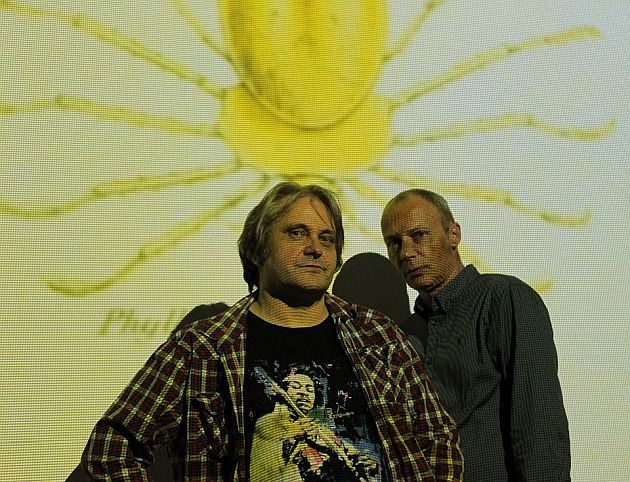 Interview with
Interview with Tom Axer (Synths, FX) from Düsseldorf
With the release of ‘Amok’ the duo DÜSSELDORF add a new dimension to their musical story. The band has a long and rich history, it was formed in 1989 and they are undoubtedly one of the pioneering projects in the field of EBM design in Poland. Established in Upper Silesian Katowice by vocalist Adam Białoń and keyboardist Adam Radecki (aka Tom Axer), the band expressed their fascination with sound experiments in the style of early KRAFTWERK, CABARET VOLTAIRE or FRONT 242.
Creating music was just a starting point for them - then ideas of typically Industrial happenings appeared, implemented in industrial facilities, where, in addition to the vocals and manifestos, machine music was planned to dominate, by “playing” it live, being one hundred percent of acoustic origin (i.e. gears, wheels and other mechanisms that emit sounds). In addition to the concerts, the group published leaflets, experimented with photography and recorded a lot of studio music, gradually departing from the original assumptions of primitive, spontaneous, Industrial rhythm and sound. Going beyond the convention of the genre, they reach for New Wave, Ambient and even Krautrock, but never losing energy with their beat they still set the dance rhythm.
I teamed up with Ralf Dörper from DIE KRUPPS, the legend of the Düsseldorf scene, to ask a few questions - not only about the past of the band and the direction the project is heading, but also to test their knowledge of the scene of the city they take name after. About DÜSSELDORF the band and Düsseldorf the city and the cultural links between Germany and Silesia with Tom Axer…
Reflections of Darkness [RoD - Karo]: Hi Guys, first of all, thank you for agreeing to this interview. Since it’s our first time talking, could you tell me more about the origins and the very concept behind the project?
Tom: Düsseldorf exists since 1989. That is, since when there were not so many instruments available, CD publishers, and even places to play gigs. The main way to promote independent music at that time was Jarocin Rock Festival - we made our debut there. Also, we organized other performances in art galleries, student clubs, and even in machine halls (!). As one of the first, we introduced Industrial / Electronic elements into music. But it is not our first band - each of us played in other projects before.
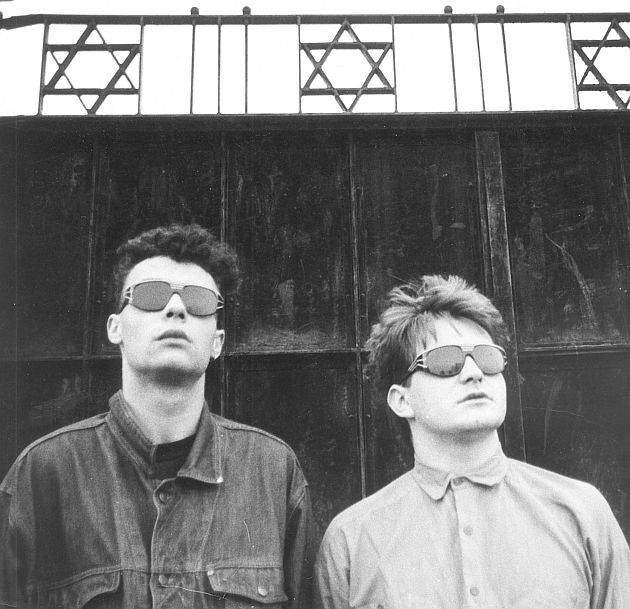
RoD - Karo: You’ve been present within the scene for years. What does it take to keep on creating and still enjoying it?
Tom: I think consequence on the one hand, distance on the other. It is still a hobby, each of us runs his own business. Thanks to this we were never too dependent on it in sense of so-called “professional” approach. Plus, we had been “frozen” for 23 years and thus remained fresh for the younger generation. We are a valuable discovery for them.
RoD - Karo: I saw you playing live at Castle Party - you were actually playing as the grand finale for the entire festival. Did you enjoy the experience?
Tom: Yes, it was great! The organizers put us in the right line-up place. We were surprised by the interest of the young audience especially
RoD - Karo: It was an extremely energetic show you played. Do you often play live? Do you like it?
Tom: Sure we like it. It is also an honest approach to the recipient who must be witness the creation process. As far as I remember only three gigs were played with tape playback - in 1993, when Atari ST music system became popular in Poland. So it was then almost impossible to play “live” on stage, and so much more complicated. Before that, the main live instrument was Moog Prodigy - playing bass lines. After that, more and more instruments are played live. At the moment we do not use any laptops on stage, just real synths, live drums, and some groove box treatments.
RoD - Karo: Your most recent release ‘Amok’ was out by Zoharum in June 2022. What is the place of this album in your entire sonic scape? How do you think it corresponds with your general style and in what way it breaks it?
Tom: On this album, we cross borders and leave a certain area. This is still our style, but we add something new to it. We raised ourselves the bar, although still don’t know where this will lead us. As you know, instrumental music is generally more demanding to everybody. So ‘Amok’ is a kind of witness to the transformation that is taking place.
RoD - Karo: What is the meaning of art, and music to you? Why did you decide to create it in the first place?
Tom: Art? For me this is an essential element to maintain internal balance - just like riding a bike but not physically. Some people need prayer, I need art, not necessarily as a creator. That’s why I spend my time watching loads of classic movies, reading as many books as I can, and listening to almost all kinds of music. But it was music that turned out to be the best form of expression for me, and for Jacek, I suppose. If I may speak for myself - electronic sounds are just like in painting. I can create images, and it’s up to me whether they will be legible, clear, colourful, etc. The use of synthesizers allows us to build some kind of short sound stories, and these stories can be about me, about others, about reality, about ideas, or anything.
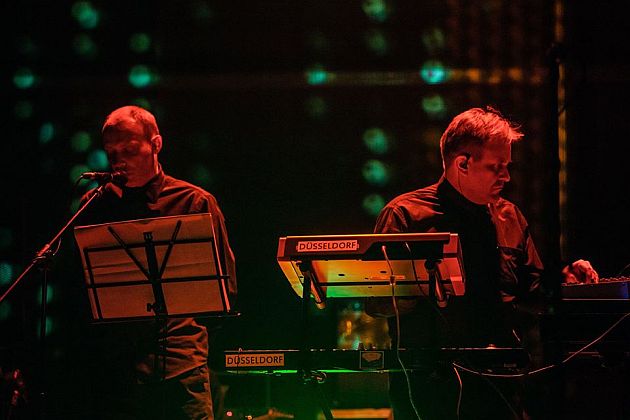
RoD - Karo: Who are the people who listen to your music? Do you keep in touch with your followers, and listen to their feedback on your art?
Tom: The most interesting are direct conversations with the audience after each gig. Thanks to this we know we have two main groups of fans: old veterans and young newcomers, who are more open and tolerant. The point of our playing is therefore to reconcile these two groups by emotional transferring from the older group to the younger one, not so familiar with classic electronic sound.
RoD - Karo: Since we have a musician from Düsseldorf whose attention you actually caught some time ago (Ralf Dörper from DIE KRUPPS) I’ll pass on to him now, to ask his questions…
Tom: Hi Ralf!
RoD - Ralf: What about Düsseldorf (the City) is generally known in Poland? Football, music, food?
Tom: In Poland - best known for its football club, Fortuna. In Upper Silesia - a city with industrial traditions, many Silesian immigrants since WW2, food similar to ours, the most “Polish” football team in Germany In Upper Silesian musician’s society - the place many influential bands come from.
RoD - Ralf: Does any of you have a personal link to Düsseldorf?
Tom: None, excluding our mental link with KlingKlang :-)
RoD - Ralf: Ok, why did you choose that name for your project?
Tom: There are many similarities between Düsseldorf and Katowice (or any of O/S cities). After all, we lived in the same country until 1918. Even now we still have a common Industrial tradition, so that time we wanted to create such kind of similarity also in musical sense. In addition, we found some similarities between Krautrock and 80s New Wave music in Silesia - both were in opposition to the existing there, although different - musical trends. And finally, the musical language was based on the same machine sounds. But the main reason was that we were described by friends as real KRAFTWERK psycho-fans.
RoD - Ralf: When was it? Any trigger?
Tom: In 1988, when we heard NITZER EBB’s ‘That Total Age’ on a radio broadcast. Why NITZER EBB? I think because of their D.A.F. - inspired musical style. So we figured if they can do it, why don’t we ?
RoD - Ralf: What connotations did you intend? Is that in-line with the expectations of your audience?
Tom: Since then we knew our band will be a duo, named DÜSSELDORF as a kind of tribute to the bands from your city. At that time fans immediately understood what we meant by the band’s name. I guess it’s normal for the younger ones to have a problem with it. So each time they ask, we explain.
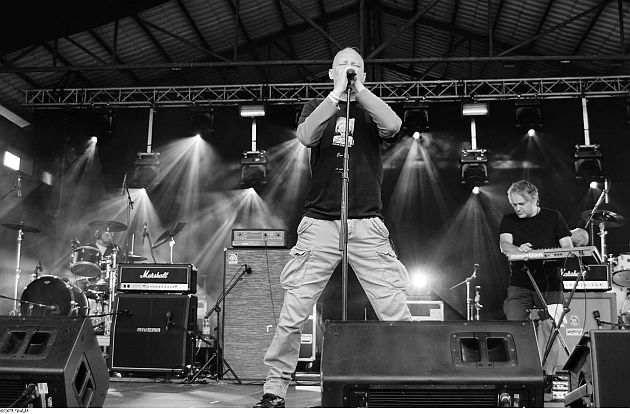
RoD - Ralf: Are you aware of the musical heritage of Düsseldorf?
Tom: Since famous KRAFTWERK’s 1981 ‘Computerwelt’ gig in Katowice, it became clear we would play similar music. Later on we discovered other artists from Düsseldorf: Conrad Schnitzler, NEU!, DAF, DIE KRUPPS... I think all of them are still present in our music in some way.
RoD - Ralf: Do you see any connection to 70s or 80s music from Düsseldorf? I.e. Synth Avant-garde or Punk / Post Punk?
Tom: In general, German culture has been always present in Silesia, still having a huge influence. It’s nothing to do with fashion, it’s a common history / tradition. As me and Adam (the second former) both have German roots, it was quite easy for us to get a BRAVO magazine with NDW-poster in the 80s. Unlike in Poland, where it was “forbidden”. So we were well-informed about what’s going on the musical scene in West-Germany, that means behind the Iron Curtain. In that way we found some similarities between Krautrock or NDW and 80s New Wave music in Silesia. We discovered that both were in opposition to the existing musical trends and our musical language is based on the same machine sounds. I recall D.A.F. was described there as a NDW-band, wasn’t it?
RoD - Ralf: Any band from Düsseldorf you would like / have liked to support ?
Tom: I think supporting DIE KRUPPS would be possible. This is still reachable, I believe. Actually, Jacek has been supporting DIE KRUPPS at Proxima, Warsaw, as a RIGOR MORTIS drummer.
RoD - Ralf: If you could curate a one-day festival including yourselves, what would it look like?
Tom: In Zabrze (Hindenburg O/S) there’s probably the lowest stage in Europe - in a coalmine, 320 metres below. Why not to perform an Industrial jam-session out there ? Famous individuals on stage, limited entrance, expensive tickets, it works for me. And it’s only three hrs by car from Germany!
RoD - Ralf: Your name is rather long and complicated... Any funny mutations of the name on flyers or posters?
Tom: We have tried “D-dorf” and “Diesel-dorf”, but with no success.
RoD - Ralf: Have you ever played in Germany?
Tom: Yes, in 2017 at Famillientreffen EBM festival, Anhalt.
RoD - Ralf: What do you assume the German people might expect given that name...?
Tom: That there must be some connection. In fact, there is. Unlike JOY DIVISION’s ‘Warsaw’ but more likely of LAIBACH.
RoD - Karo: …and I’ll take over for some final questions. With the release of ‘Amok’ are you planning any live shows?
Tom: Actually, we do play ‘Amok’ gigs. The CP2022 gig was the first one. Setlist consist of almost all tracks, except one.
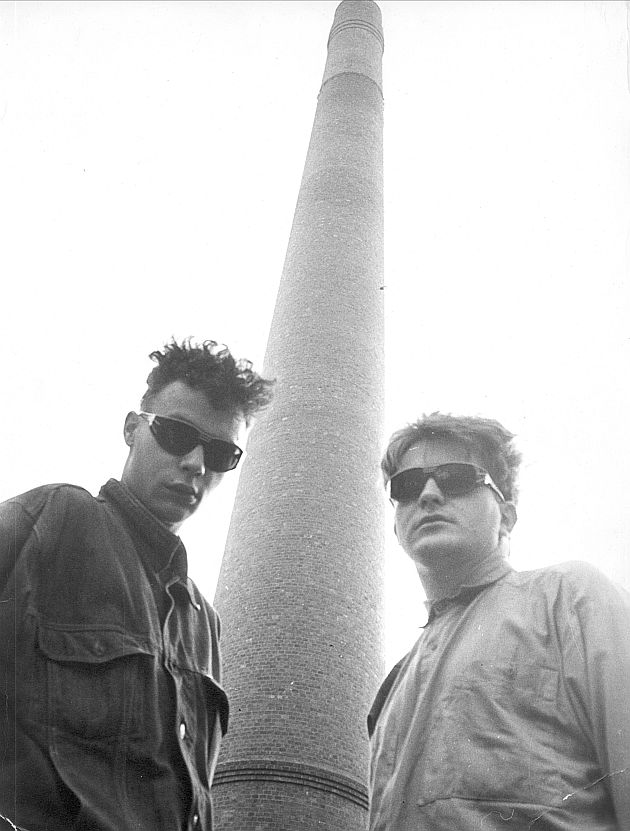
RoD - Karo: We stated at the very beginning you have been active for years. How would you say the scene has changed through years? And how have you changed as musicians?
Tom: We see that the contemporary electronic scene no longer surprises with its sounds, but it can still surprise with its form. We are also concerned about the excessive imitation of young artists, mainly caused by too much technology. We imitated too, but not as much [laughs]. On the other hand, the older bands have to change, although not necessarily in the same way as the younger ones. It's always important not to be boring but to remain interesting. As musicians, we both have become more modest in terms of how we approach music composition, and more open to new ideas. We also like to improvise more on stage.
RoD - Karo: What can we expect from you in the following months? Are you working on some new music now?
Tom: The earlier EBM concept-album ‘Bunker Musick’ - with German vocalist, Leander Roenick from ELEKTROKRAFT - will soon be in production. At the composition stage is the ‘Druckmaschine-Sonate’, music for piano and printing machines, more acoustic, rather difficult to perform on stage. We are also working on a new concert programme, based on instrumental improvisations, some of which will certainly be recorded on the next album.
RoD - Karo: Thank you very much for your time!
Tom: We also thank you and invite to our gigs!
All Pictures by Düsseldorf





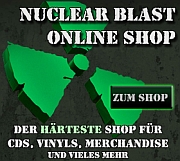
Comments powered by CComment